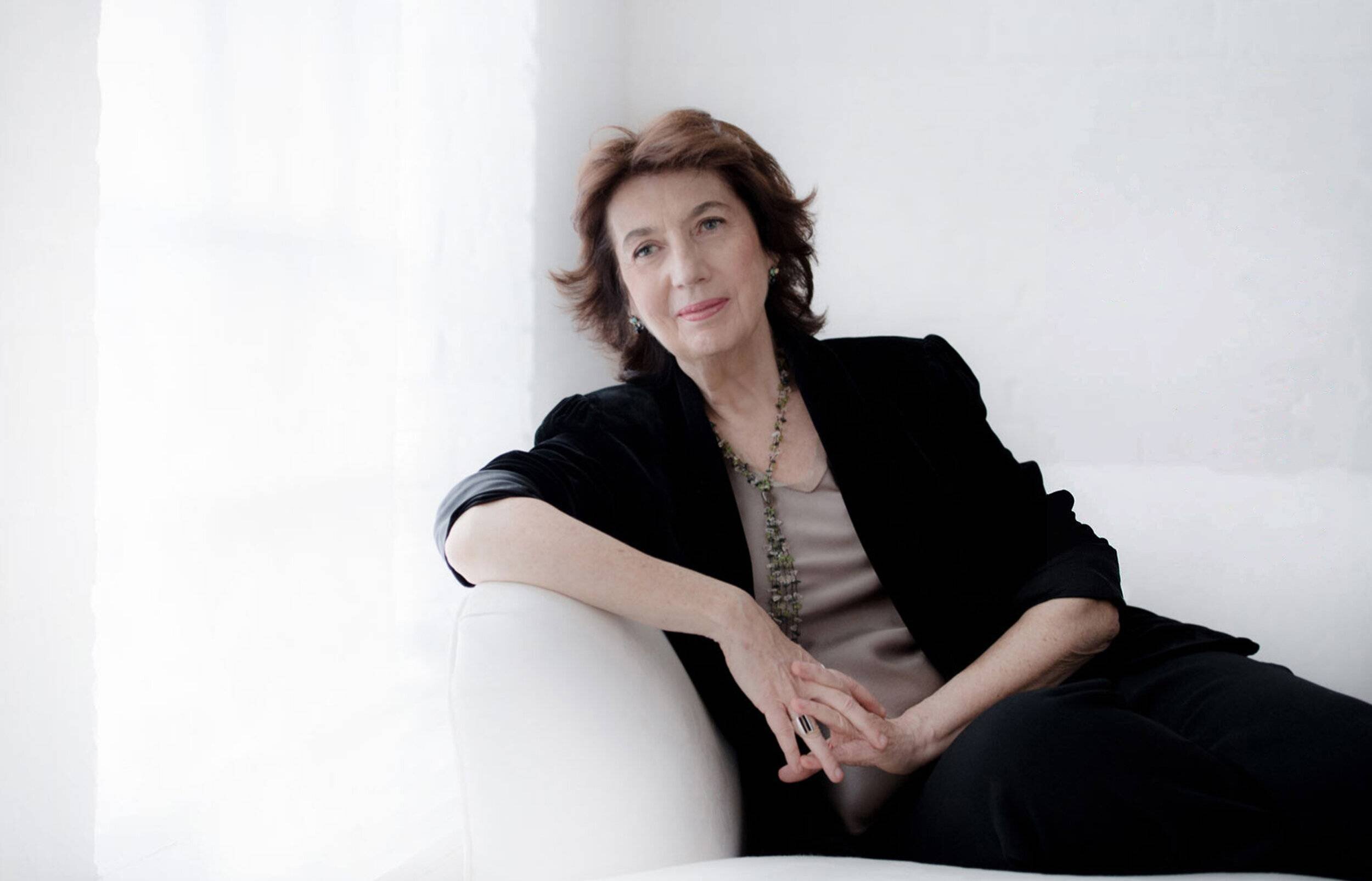
Biography
‘Imogen is one of the greatest musicians England has produced. She's utterly without show. Mozart, Schumann and Schubert could have been written for her. There's a poetic, reflective side to her which is always there in her playing. It isn't Imogen's style to play to the gallery. She's not someone who goes in for fireworks in the rafters. But I can bet you that if I were to ask any orchestral musicians who they rate as one of the best Mozart pianists, three out of four of them will come up with Imogen's name first time around. Orchestral musicians are the toughest critics.'
Sir Simon Rattle
A Musical Background
Family Photo
'I was born in London. My father was Martin Cooper the musicologist and my mother, Mary Stewart, was an artist. I was the youngest of four children, after Felicity, Josephine and Dominic. Hearing music all around the family home, it was natural to climb up on the piano stool and experiment. As a three-year-old, one of my favourite games was to sit under the piano and have my parents play hideously discordant harmonies so that I could tell them all the notes. I announced at the age of five that I wanted to be a concert pianist and I still yearned to be a pianist at the age of 12.
Only the best
Jacques Février (left) with Maurice Ravel in Paris in 1937
'Since there were no specialist music schools in England at the time, my parents decided I must go either to Paris or to Moscow. Moscow was too remote, so I went to Paris, alone – while they stayed at home with the rest of the family. It was an unconventional decision and caused a furore in the English musical establishment. I had to audition for the great French pianist friend of Maurice Ravel and Francis Poulenc, Jacques Février, which was unnerving for an 11 year old. He said to my parents, "She has a lot to learn but she already has what I cannot teach her”. I lived in a hostel and was taken to the Conservatoire every day by nuns. I came back to London for the holidays, but I was a little French girl. I didn't speak English that well, it was full of Gallicisms. But I loved Paris, and my main teachers, Février and Yvonne Lefébure, made a big mark on my young mind. Six years later the Conservatoire awarded me a Premier Prix de Piano. Back in London I played to Arthur Rubinstein and Clifford Curzon who were inspirational, and in 1969 I won the London Mozart Players' Mozart Memorial Prize. Mozart has remained a great love and he has a special place
in my heart.‘
A demanding teacher
Alfred Brendel in Vienna. photo: alfredbrendel.com
‘Soon after my return to London I heard Alfred Brendel playing Schubert and Chopin at the Austrian Institute. It was fascinating. I went up to him afterwards and said, “I must work with you or I'll die”. He answered, “Why don’t you live and come to Vienna?” The experience changed my life. He gave me time without parameters, we would work for hours on end, then we would sit down and listen to Furtwängler, Fischer, Cortot, the Busch Quartet, Kempff, Lotte Lehmann . . . It was an education, and an enriching experience. He was absolutely uncompromising about how he felt things should be, but also completely convincing, articulate and eloquent. It was a privilege and I learned a huge amount from him: how to listen, how to be aware of what I was doing, the meaning and shape of the phrase and not just the notes. It was a seminally important time for me and formed the basis of my adult music-making.
Recordings: Live v. Studio
'I have always wanted to record more live. The real test of an artist’s strength of conviction and capacity to convey this conviction with inspiration is on the stage. I in no way denigrate studio recordings; there is a luxury in being able to do another take or three if needed, and I love the monastic bubble in which one lives during a recording period – just the music, the result, nothing else exists. But a live performance is a truer record of a statement of intent at a given time of one’s life, and I feel strongly that I have so much more to say these days than I did in my earlier years. The energy of a listening audience fuels the process to a maximum.
Selected recordings over the years
2019 IBERIA Y FRANCIA: Mompou, Debussy, Albéniz, Ravel, Falla (Chandos/CHAN20119)
The energy of a listening audience fuels the process
photo : Sussie Ahlburg
2018 BEETHOVEN DIABELLI VARIATIONS op 120: (Chandos/CHAN20085)
2017 LISZT and WAGNER: (Chandos/CHAN10938)
2016 IMOGEN COOPER’S CHOPIN: (Chandos/CHAN10902)
2015 SCHUMANN: Abegg Variations op 1, Davidsbündlertänze op 6 etc. (Chandos/CHAN10874)
2012 SCHUBERT SONG CYCLES with WOLFGANG HOLZMAIR: Die Winterreise, Die schöne Müllerin, Schwanengesang, (Decca Box set/CD0289 478 42729)
2010 MOZART PIANO CONCERTOS 22 and 18: (Avie/AV22002009 )
2009 HUGO WOLF SONGS with WOLFGANG HOLZMAIR: (Wigmore Hall Live/WHLIVE0029)
2008-2010 SCHUBERT LIVE, VOLUMES 1,2, and 3 (Avie/AV2156,AV2157,AV2158)
2006 MOZART PIANO CONCERTOS 23 and 9: (Avie/AV2100)
2002 EICHENDORFF LIEDER with WOLFGANG HOLZMAIR: (Philips/464-991-2)
2002 ROBERT and CLARA SCHUMANN LIEDER with WOLFGANG HOLZMAIR (Philips/462-610-2)
Lieder and chamber music
'Partnering singers and playing chamber music are vital to me. A soloist’s life, a pianist’s life in particular, is extremely solitary, and sharing pleasures and pains (even just those of being on the road) with colleagues – who in my case are always friends, too – is a healthy change. Furthermore, the repertoire is so rich.
Imogen Cooper and Wolfgang Holzmair, 2010.
photo: Benjamin Ealovega
‘My collaboration with Wolfgang Holzmair goes back over 20 years. We got together through a joint manager at the time and had an instant musical rapport despite our different backgrounds. I was taken not only by the sheer beauty of his voice, then a rather silvery high baritone, but also by his passionate attention to text and its meaning, which ultimately dictated all his decisions. We have never needed to rehearse for long hours and have never argued. He is also not the sort of singer who needs support and advice over vocal matters, which is good because I do not know so much, still, about the process of singing – and he always encourages his partner to really be that, a partner, not an accompanist (a word I dislike).
‘I have also greatly enjoyed collaborations with Mark Padmore,
Dame Sarah Connolly, Ian Bostridge, Henk Neven, Christianne Stotijn,
the Belcea String Quartet, Sonia Wieder-Atherton, Adrian Brendel and Henning Kraggerud, all of whom without exception are treasured colleagues from whom I have learned a lot and to whom I am very close.
The modern repertoire
Imogen Cooper playing at Bunka Kaikan, Tokyo.
photo: Shinji Takehara
'I came to contemporary music late, being of a generation, now past, I am glad to say, who grew up within choices made – you were a soloist, or an accompanist, or a chamber music player, or a contemporary music specialist. Labelling may be easier for the music business to deal with, but a rounded musician should experience it all, and most younger musicians now do. Michael Berkeley, then director of the Cheltenham Festival, called me and said, "Imogen, it is about time you played a contemporarywork – who would you like to commission?” Having being struck dumb by hearing Tom play his own music, I took a deep breath and said “Thomas Adès”. There was a short silence and Michael said, “Nothing like jumping in the deep end”. How right he was. There started three months of intense work on a score, ‘Traced Overhead’, written over often many staves covering the whole keyboard, and conjuring up the most fantastic sounds of the greatest beauty and originality. It took me four weeks to read an 11-minute score through from beginning to end. But the sense of achievement, each time I play this work, is colossal. I am still a slow learner of contemporary music, which is why I don’t find the time to do as much of it as I would like; it needs much forward organization.
Honours
30 December 2006, Awarded the Commander of the Order of the British Empire (CBE) in the 2007 New Years Honours List for services to music.
28 August 2020, Awarded The Queen's Medal for Music 2019. Imogen is the first pianist to be awarded this honour. On receiving the award, she says:
“I am humbled and honoured to be receiving The Queen’s Medal for Music, following a line of distinguished colleagues whose achievements I have always admired, I believe that the power of music is like no other within the arts – vitally necessary to calibrate, stimulate, move and nurture us in these turbulent times. Through the Imogen Cooper Music Trust, I am more than gratified to reinforce this power to a younger generation, who are starting on a long journey. My heartfelt and respectful thanks to Her Majesty.” Chairman of the nominating committee, Master of The Queen's Music, Judith Weir, said, “A historically important British solo pianist, Imogen Cooper has devoted her extensive, and ongoing, performing career to her repertoire, richly upholding the values of classical music as an inspiration to listeners and colleagues worldwide”.
11 June 2021, Created Dame Commander of the Order of the British Empire (DBE) in the 2021 Birthday Honours for services to music.
Awards
1969 The London Mozart Players' Mozart Memorial Prize
1997 Honorary Member of the Royal Academy of Music
1999 Honorary Doctor of Music at Exeter University
2008 Royal Philharmonic Society Performers Award
2013 Humanitas Visiting Professorship
2024 Fellow of the Royal Northern College of Music
Supporting Young Musicians
2008 Mentor on The Royal Philharmonic Society Philip Langridge Mentoring Scheme
2015 Establishes the Imogen Cooper Music Trust for gifted young musicians
2018 Joins the Jury of The Leeds International Piano Competition
2021 & 2024 Chair of The Jury of The Leeds International Piano Competition








